E-Portfolio: Self-Assessment in Coaching and Mentoring
VerifiedAdded on 2020/10/23
|9
|2787
|475
Report
AI Summary
This e-portfolio report presents a self-assessment within the context of coaching and mentoring practices. It begins with an introduction to self-evaluation and its importance in identifying strengths and weaknesses. The main body of the report focuses on reflective learning using the GROW model, detailing goal setting, reality assessment, opportunity identification, and the formulation of a personal development plan. The report also includes an evaluation of the effectiveness of the plan, highlighting areas for improvement such as active listening and time management. The student utilizes Gibb's reflective cycle to further analyze the learning experience and identifies written communication skills as another area for development. The report concludes with a personal development plan outlining specific actions, timelines, and resources for improving these skills. The evaluation section assesses the effectiveness of the coaching and mentoring process and emphasizes the importance of continuous self-improvement. The report showcases the student's journey of self-evaluation and development within the coaching and mentoring framework.

E- PORTFOLIO
Paraphrase This Document
Need a fresh take? Get an instant paraphrase of this document with our AI Paraphraser
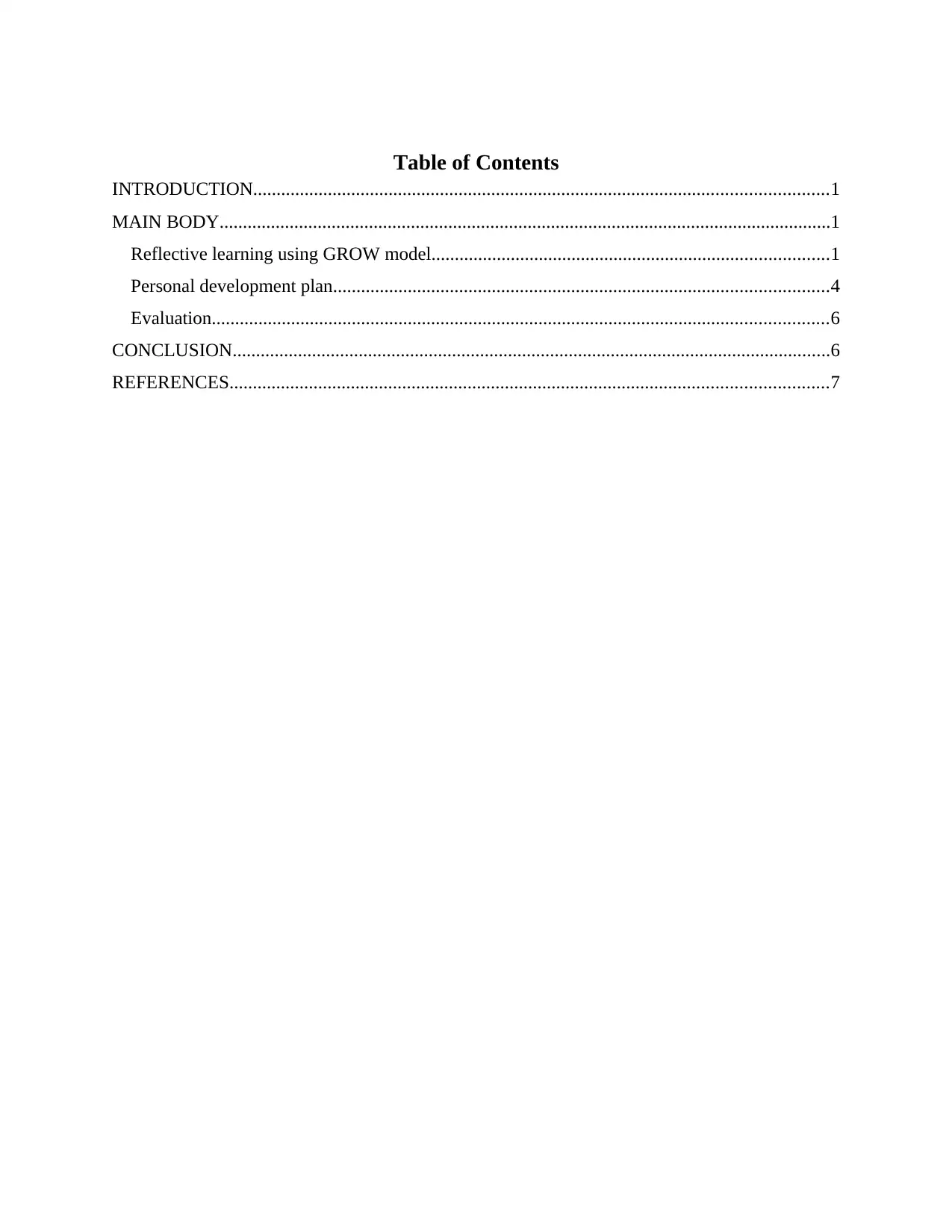
Table of Contents
INTRODUCTION...........................................................................................................................1
MAIN BODY...................................................................................................................................1
Reflective learning using GROW model.....................................................................................1
Personal development plan..........................................................................................................4
Evaluation....................................................................................................................................6
CONCLUSION................................................................................................................................6
REFERENCES................................................................................................................................7
INTRODUCTION...........................................................................................................................1
MAIN BODY...................................................................................................................................1
Reflective learning using GROW model.....................................................................................1
Personal development plan..........................................................................................................4
Evaluation....................................................................................................................................6
CONCLUSION................................................................................................................................6
REFERENCES................................................................................................................................7
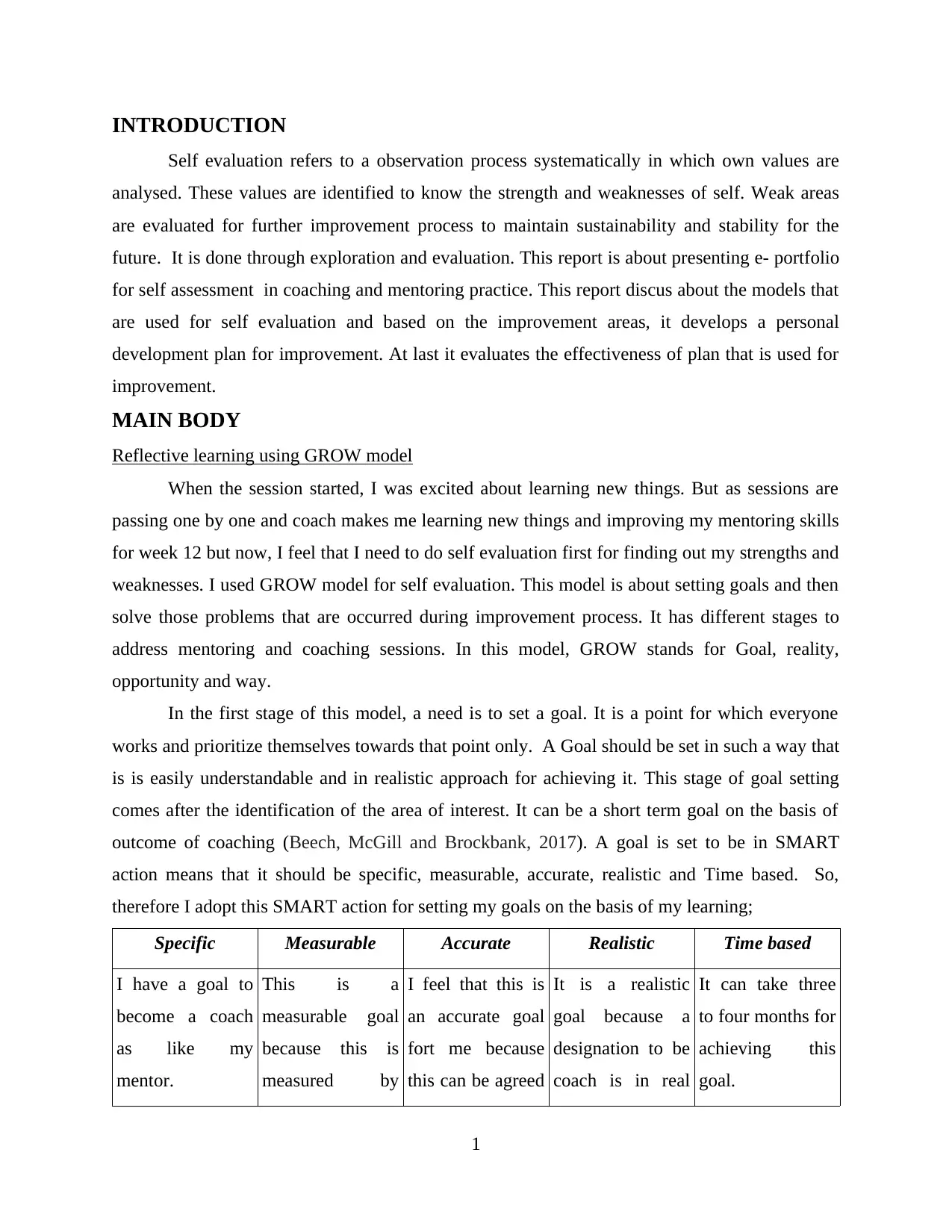
INTRODUCTION
Self evaluation refers to a observation process systematically in which own values are
analysed. These values are identified to know the strength and weaknesses of self. Weak areas
are evaluated for further improvement process to maintain sustainability and stability for the
future. It is done through exploration and evaluation. This report is about presenting e- portfolio
for self assessment in coaching and mentoring practice. This report discus about the models that
are used for self evaluation and based on the improvement areas, it develops a personal
development plan for improvement. At last it evaluates the effectiveness of plan that is used for
improvement.
MAIN BODY
Reflective learning using GROW model
When the session started, I was excited about learning new things. But as sessions are
passing one by one and coach makes me learning new things and improving my mentoring skills
for week 12 but now, I feel that I need to do self evaluation first for finding out my strengths and
weaknesses. I used GROW model for self evaluation. This model is about setting goals and then
solve those problems that are occurred during improvement process. It has different stages to
address mentoring and coaching sessions. In this model, GROW stands for Goal, reality,
opportunity and way.
In the first stage of this model, a need is to set a goal. It is a point for which everyone
works and prioritize themselves towards that point only. A Goal should be set in such a way that
is is easily understandable and in realistic approach for achieving it. This stage of goal setting
comes after the identification of the area of interest. It can be a short term goal on the basis of
outcome of coaching (Beech, McGill and Brockbank, 2017). A goal is set to be in SMART
action means that it should be specific, measurable, accurate, realistic and Time based. So,
therefore I adopt this SMART action for setting my goals on the basis of my learning;
Specific Measurable Accurate Realistic Time based
I have a goal to
become a coach
as like my
mentor.
This is a
measurable goal
because this is
measured by
I feel that this is
an accurate goal
fort me because
this can be agreed
It is a realistic
goal because a
designation to be
coach is in real
It can take three
to four months for
achieving this
goal.
1
Self evaluation refers to a observation process systematically in which own values are
analysed. These values are identified to know the strength and weaknesses of self. Weak areas
are evaluated for further improvement process to maintain sustainability and stability for the
future. It is done through exploration and evaluation. This report is about presenting e- portfolio
for self assessment in coaching and mentoring practice. This report discus about the models that
are used for self evaluation and based on the improvement areas, it develops a personal
development plan for improvement. At last it evaluates the effectiveness of plan that is used for
improvement.
MAIN BODY
Reflective learning using GROW model
When the session started, I was excited about learning new things. But as sessions are
passing one by one and coach makes me learning new things and improving my mentoring skills
for week 12 but now, I feel that I need to do self evaluation first for finding out my strengths and
weaknesses. I used GROW model for self evaluation. This model is about setting goals and then
solve those problems that are occurred during improvement process. It has different stages to
address mentoring and coaching sessions. In this model, GROW stands for Goal, reality,
opportunity and way.
In the first stage of this model, a need is to set a goal. It is a point for which everyone
works and prioritize themselves towards that point only. A Goal should be set in such a way that
is is easily understandable and in realistic approach for achieving it. This stage of goal setting
comes after the identification of the area of interest. It can be a short term goal on the basis of
outcome of coaching (Beech, McGill and Brockbank, 2017). A goal is set to be in SMART
action means that it should be specific, measurable, accurate, realistic and Time based. So,
therefore I adopt this SMART action for setting my goals on the basis of my learning;
Specific Measurable Accurate Realistic Time based
I have a goal to
become a coach
as like my
mentor.
This is a
measurable goal
because this is
measured by
I feel that this is
an accurate goal
fort me because
this can be agreed
It is a realistic
goal because a
designation to be
coach is in real
It can take three
to four months for
achieving this
goal.
1
⊘ This is a preview!⊘
Do you want full access?
Subscribe today to unlock all pages.

Trusted by 1+ million students worldwide

checking the
position of mine
to be designated
as a coach.
by my mentors as
I have that much
skills which a
coach should
have.
and in approach
of a well skilled
candidate (Gould,
2016).
Now next stage of GROW model is to check the reality of self where I am standing. It is
evaluated by the coach or mentor to know the current position or situations related to future
goals. It takes time to identify the current status because information and opinions need to
collected by different persons which is a lengthy and time consuming process. When I start
evaluating self reality about position ans status of mine towards a goal of becoming coach, then I
take opinions from different batch mates and my mentors about my skills for a coach. Then I get
to know that I am about 60% responsible for becoming a coach. There are some areas in mine
which need improvement. My mentor told me that I am some weaker areas in listening skills. I
don not listen the information fully and start giving ideas by becoming a barrier in between. A
coach should have good listening skills to identify the problems and then draw a conclusion. But
they also told me that I have good leadership skills which is my strengths areas. I can lead a team
very effectively and efficiently (Bruno and Dell’Aversana, 2018). Now another mentor gives a
opinion about my ranking in becoming a coach. They ranked me 8 out of 10 because of my
weaknesses in time management skills. They told me that punctuality is very necessary for every
coach because those who are taking coaching are following the coach. Time management makes
easier for every person for achieving the goals. After listening this, I also feels that I am not
punctual. This is my weaker area. Other batch mates also identifies the strength for being a
coach. They told me that I am good in explaining and making others understand. A coach should
have this skill to make other understand and I have that. By listening this, I was too positive
towards my skills. But I was afraid of my weaknesses in listening skills and time management
skills.
Another stage is to identify the obstacles which occurred in between goals and reality. If
there is no obstacle then it means that goals are achieved. In my case, there were two obstacles
that were found out during my session and taking opinions (Martin, 2016). One is of my active
listening skills and another is of time management skills. For improving these skills, I need a
2
position of mine
to be designated
as a coach.
by my mentors as
I have that much
skills which a
coach should
have.
and in approach
of a well skilled
candidate (Gould,
2016).
Now next stage of GROW model is to check the reality of self where I am standing. It is
evaluated by the coach or mentor to know the current position or situations related to future
goals. It takes time to identify the current status because information and opinions need to
collected by different persons which is a lengthy and time consuming process. When I start
evaluating self reality about position ans status of mine towards a goal of becoming coach, then I
take opinions from different batch mates and my mentors about my skills for a coach. Then I get
to know that I am about 60% responsible for becoming a coach. There are some areas in mine
which need improvement. My mentor told me that I am some weaker areas in listening skills. I
don not listen the information fully and start giving ideas by becoming a barrier in between. A
coach should have good listening skills to identify the problems and then draw a conclusion. But
they also told me that I have good leadership skills which is my strengths areas. I can lead a team
very effectively and efficiently (Bruno and Dell’Aversana, 2018). Now another mentor gives a
opinion about my ranking in becoming a coach. They ranked me 8 out of 10 because of my
weaknesses in time management skills. They told me that punctuality is very necessary for every
coach because those who are taking coaching are following the coach. Time management makes
easier for every person for achieving the goals. After listening this, I also feels that I am not
punctual. This is my weaker area. Other batch mates also identifies the strength for being a
coach. They told me that I am good in explaining and making others understand. A coach should
have this skill to make other understand and I have that. By listening this, I was too positive
towards my skills. But I was afraid of my weaknesses in listening skills and time management
skills.
Another stage is to identify the obstacles which occurred in between goals and reality. If
there is no obstacle then it means that goals are achieved. In my case, there were two obstacles
that were found out during my session and taking opinions (Martin, 2016). One is of my active
listening skills and another is of time management skills. For improving these skills, I need a
2
Paraphrase This Document
Need a fresh take? Get an instant paraphrase of this document with our AI Paraphraser
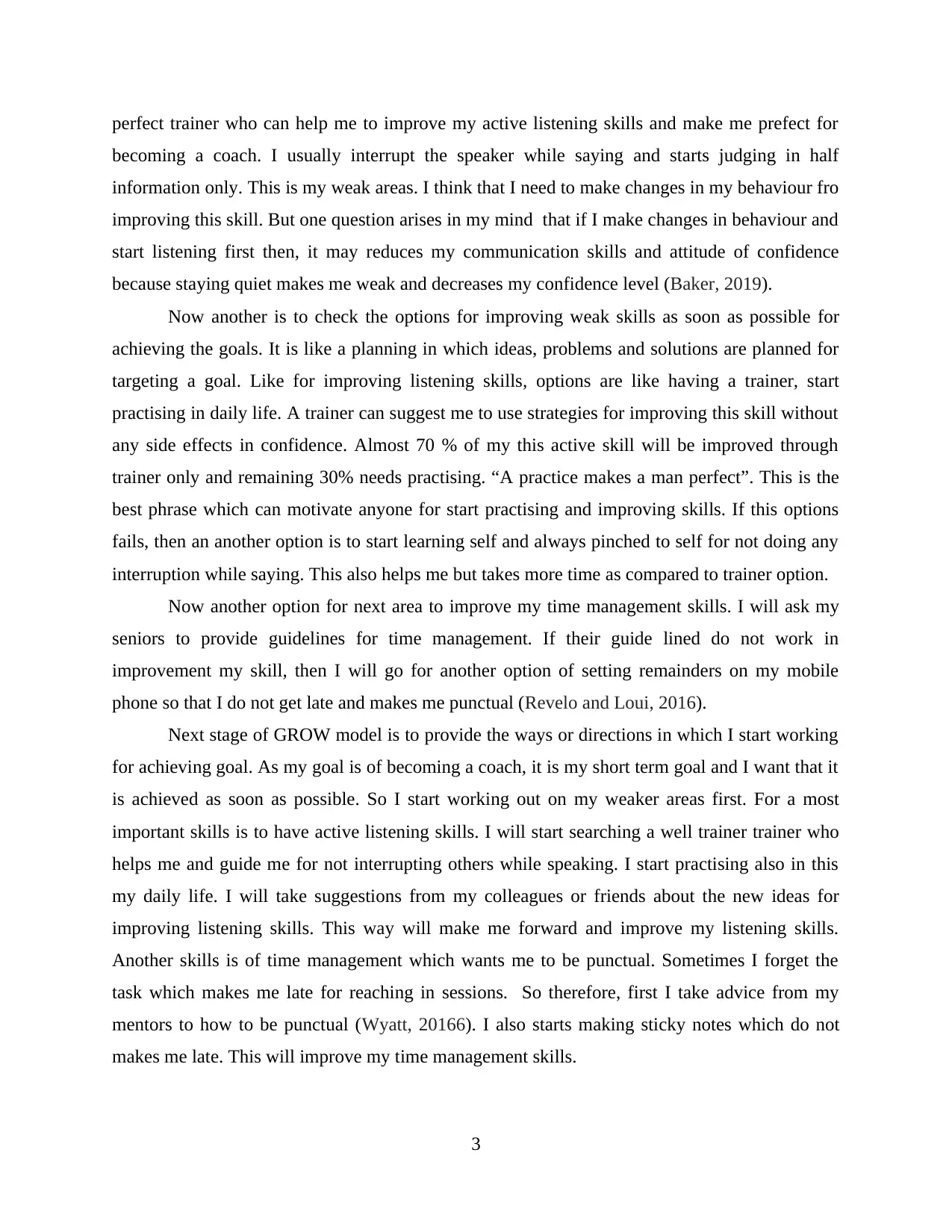
perfect trainer who can help me to improve my active listening skills and make me prefect for
becoming a coach. I usually interrupt the speaker while saying and starts judging in half
information only. This is my weak areas. I think that I need to make changes in my behaviour fro
improving this skill. But one question arises in my mind that if I make changes in behaviour and
start listening first then, it may reduces my communication skills and attitude of confidence
because staying quiet makes me weak and decreases my confidence level (Baker, 2019).
Now another is to check the options for improving weak skills as soon as possible for
achieving the goals. It is like a planning in which ideas, problems and solutions are planned for
targeting a goal. Like for improving listening skills, options are like having a trainer, start
practising in daily life. A trainer can suggest me to use strategies for improving this skill without
any side effects in confidence. Almost 70 % of my this active skill will be improved through
trainer only and remaining 30% needs practising. “A practice makes a man perfect”. This is the
best phrase which can motivate anyone for start practising and improving skills. If this options
fails, then an another option is to start learning self and always pinched to self for not doing any
interruption while saying. This also helps me but takes more time as compared to trainer option.
Now another option for next area to improve my time management skills. I will ask my
seniors to provide guidelines for time management. If their guide lined do not work in
improvement my skill, then I will go for another option of setting remainders on my mobile
phone so that I do not get late and makes me punctual (Revelo and Loui, 2016).
Next stage of GROW model is to provide the ways or directions in which I start working
for achieving goal. As my goal is of becoming a coach, it is my short term goal and I want that it
is achieved as soon as possible. So I start working out on my weaker areas first. For a most
important skills is to have active listening skills. I will start searching a well trainer trainer who
helps me and guide me for not interrupting others while speaking. I start practising also in this
my daily life. I will take suggestions from my colleagues or friends about the new ideas for
improving listening skills. This way will make me forward and improve my listening skills.
Another skills is of time management which wants me to be punctual. Sometimes I forget the
task which makes me late for reaching in sessions. So therefore, first I take advice from my
mentors to how to be punctual (Wyatt, 20166). I also starts making sticky notes which do not
makes me late. This will improve my time management skills.
3
becoming a coach. I usually interrupt the speaker while saying and starts judging in half
information only. This is my weak areas. I think that I need to make changes in my behaviour fro
improving this skill. But one question arises in my mind that if I make changes in behaviour and
start listening first then, it may reduces my communication skills and attitude of confidence
because staying quiet makes me weak and decreases my confidence level (Baker, 2019).
Now another is to check the options for improving weak skills as soon as possible for
achieving the goals. It is like a planning in which ideas, problems and solutions are planned for
targeting a goal. Like for improving listening skills, options are like having a trainer, start
practising in daily life. A trainer can suggest me to use strategies for improving this skill without
any side effects in confidence. Almost 70 % of my this active skill will be improved through
trainer only and remaining 30% needs practising. “A practice makes a man perfect”. This is the
best phrase which can motivate anyone for start practising and improving skills. If this options
fails, then an another option is to start learning self and always pinched to self for not doing any
interruption while saying. This also helps me but takes more time as compared to trainer option.
Now another option for next area to improve my time management skills. I will ask my
seniors to provide guidelines for time management. If their guide lined do not work in
improvement my skill, then I will go for another option of setting remainders on my mobile
phone so that I do not get late and makes me punctual (Revelo and Loui, 2016).
Next stage of GROW model is to provide the ways or directions in which I start working
for achieving goal. As my goal is of becoming a coach, it is my short term goal and I want that it
is achieved as soon as possible. So I start working out on my weaker areas first. For a most
important skills is to have active listening skills. I will start searching a well trainer trainer who
helps me and guide me for not interrupting others while speaking. I start practising also in this
my daily life. I will take suggestions from my colleagues or friends about the new ideas for
improving listening skills. This way will make me forward and improve my listening skills.
Another skills is of time management which wants me to be punctual. Sometimes I forget the
task which makes me late for reaching in sessions. So therefore, first I take advice from my
mentors to how to be punctual (Wyatt, 20166). I also starts making sticky notes which do not
makes me late. This will improve my time management skills.
3
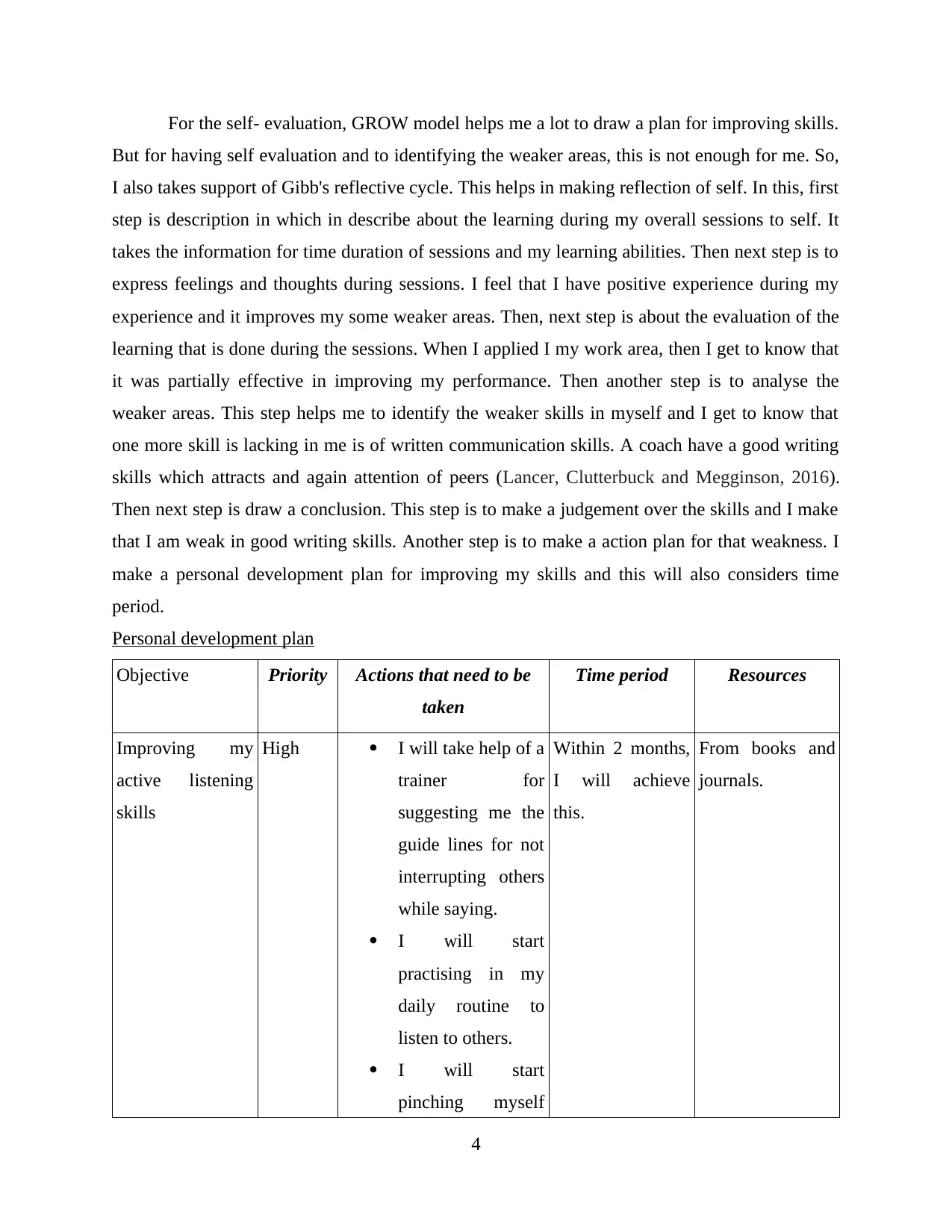
For the self- evaluation, GROW model helps me a lot to draw a plan for improving skills.
But for having self evaluation and to identifying the weaker areas, this is not enough for me. So,
I also takes support of Gibb's reflective cycle. This helps in making reflection of self. In this, first
step is description in which in describe about the learning during my overall sessions to self. It
takes the information for time duration of sessions and my learning abilities. Then next step is to
express feelings and thoughts during sessions. I feel that I have positive experience during my
experience and it improves my some weaker areas. Then, next step is about the evaluation of the
learning that is done during the sessions. When I applied I my work area, then I get to know that
it was partially effective in improving my performance. Then another step is to analyse the
weaker areas. This step helps me to identify the weaker skills in myself and I get to know that
one more skill is lacking in me is of written communication skills. A coach have a good writing
skills which attracts and again attention of peers (Lancer, Clutterbuck and Megginson, 2016).
Then next step is draw a conclusion. This step is to make a judgement over the skills and I make
that I am weak in good writing skills. Another step is to make a action plan for that weakness. I
make a personal development plan for improving my skills and this will also considers time
period.
Personal development plan
Objective Priority Actions that need to be
taken
Time period Resources
Improving my
active listening
skills
High I will take help of a
trainer for
suggesting me the
guide lines for not
interrupting others
while saying.
I will start
practising in my
daily routine to
listen to others.
I will start
pinching myself
Within 2 months,
I will achieve
this.
From books and
journals.
4
But for having self evaluation and to identifying the weaker areas, this is not enough for me. So,
I also takes support of Gibb's reflective cycle. This helps in making reflection of self. In this, first
step is description in which in describe about the learning during my overall sessions to self. It
takes the information for time duration of sessions and my learning abilities. Then next step is to
express feelings and thoughts during sessions. I feel that I have positive experience during my
experience and it improves my some weaker areas. Then, next step is about the evaluation of the
learning that is done during the sessions. When I applied I my work area, then I get to know that
it was partially effective in improving my performance. Then another step is to analyse the
weaker areas. This step helps me to identify the weaker skills in myself and I get to know that
one more skill is lacking in me is of written communication skills. A coach have a good writing
skills which attracts and again attention of peers (Lancer, Clutterbuck and Megginson, 2016).
Then next step is draw a conclusion. This step is to make a judgement over the skills and I make
that I am weak in good writing skills. Another step is to make a action plan for that weakness. I
make a personal development plan for improving my skills and this will also considers time
period.
Personal development plan
Objective Priority Actions that need to be
taken
Time period Resources
Improving my
active listening
skills
High I will take help of a
trainer for
suggesting me the
guide lines for not
interrupting others
while saying.
I will start
practising in my
daily routine to
listen to others.
I will start
pinching myself
Within 2 months,
I will achieve
this.
From books and
journals.
4
⊘ This is a preview!⊘
Do you want full access?
Subscribe today to unlock all pages.

Trusted by 1+ million students worldwide
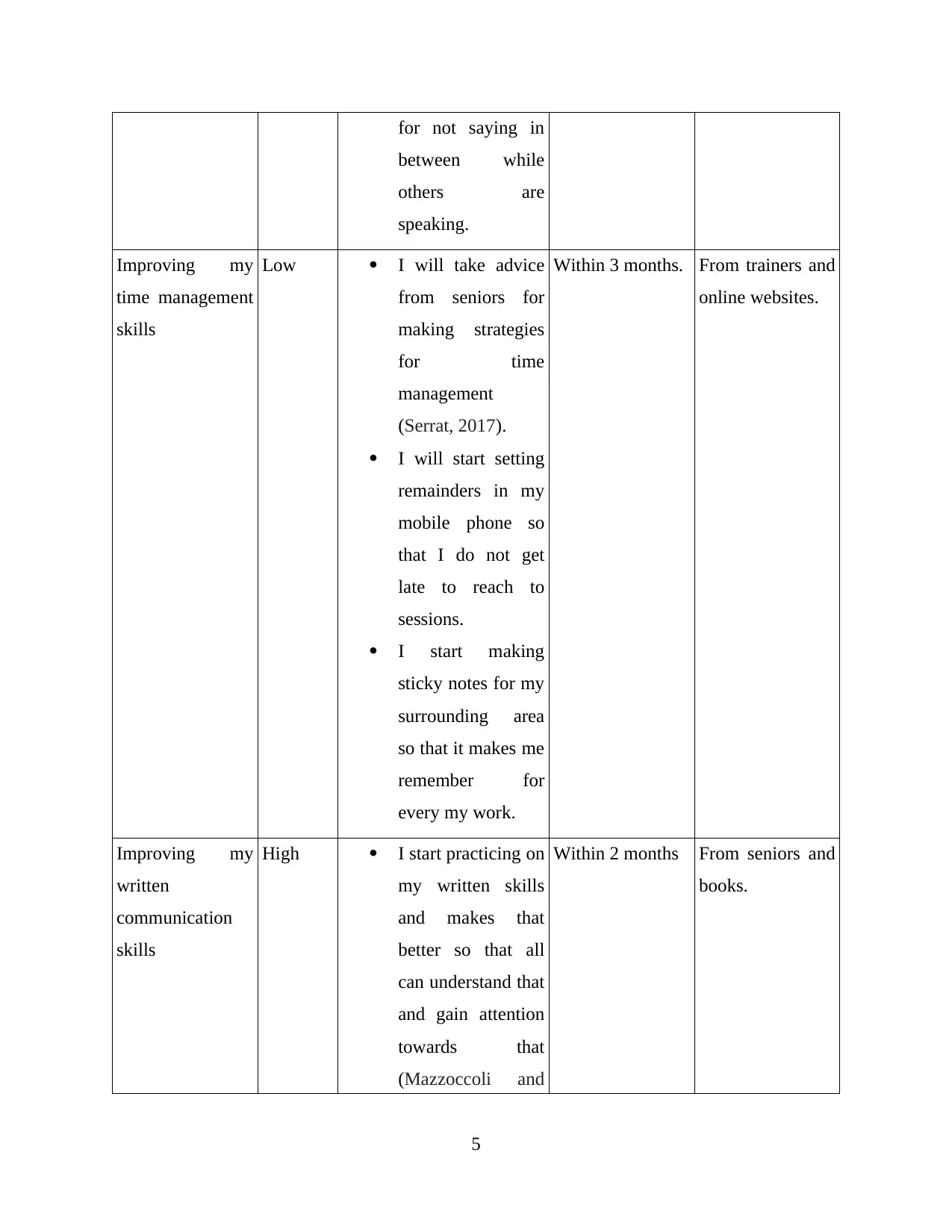
for not saying in
between while
others are
speaking.
Improving my
time management
skills
Low I will take advice
from seniors for
making strategies
for time
management
(Serrat, 2017).
I will start setting
remainders in my
mobile phone so
that I do not get
late to reach to
sessions.
I start making
sticky notes for my
surrounding area
so that it makes me
remember for
every my work.
Within 3 months. From trainers and
online websites.
Improving my
written
communication
skills
High I start practicing on
my written skills
and makes that
better so that all
can understand that
and gain attention
towards that
(Mazzoccoli and
Within 2 months From seniors and
books.
5
between while
others are
speaking.
Improving my
time management
skills
Low I will take advice
from seniors for
making strategies
for time
management
(Serrat, 2017).
I will start setting
remainders in my
mobile phone so
that I do not get
late to reach to
sessions.
I start making
sticky notes for my
surrounding area
so that it makes me
remember for
every my work.
Within 3 months. From trainers and
online websites.
Improving my
written
communication
skills
High I start practicing on
my written skills
and makes that
better so that all
can understand that
and gain attention
towards that
(Mazzoccoli and
Within 2 months From seniors and
books.
5
Paraphrase This Document
Need a fresh take? Get an instant paraphrase of this document with our AI Paraphraser
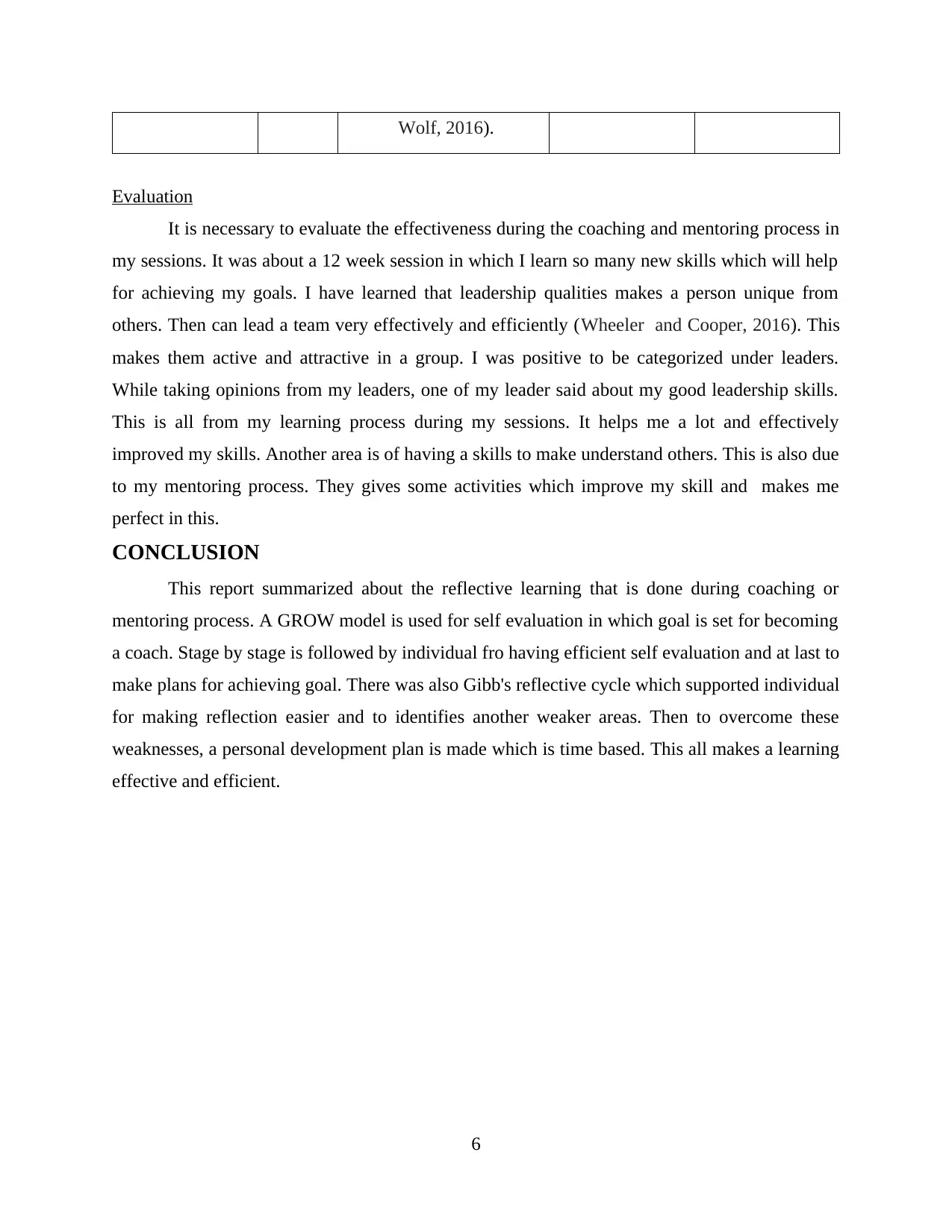
Wolf, 2016).
Evaluation
It is necessary to evaluate the effectiveness during the coaching and mentoring process in
my sessions. It was about a 12 week session in which I learn so many new skills which will help
for achieving my goals. I have learned that leadership qualities makes a person unique from
others. Then can lead a team very effectively and efficiently (Wheeler and Cooper, 2016). This
makes them active and attractive in a group. I was positive to be categorized under leaders.
While taking opinions from my leaders, one of my leader said about my good leadership skills.
This is all from my learning process during my sessions. It helps me a lot and effectively
improved my skills. Another area is of having a skills to make understand others. This is also due
to my mentoring process. They gives some activities which improve my skill and makes me
perfect in this.
CONCLUSION
This report summarized about the reflective learning that is done during coaching or
mentoring process. A GROW model is used for self evaluation in which goal is set for becoming
a coach. Stage by stage is followed by individual fro having efficient self evaluation and at last to
make plans for achieving goal. There was also Gibb's reflective cycle which supported individual
for making reflection easier and to identifies another weaker areas. Then to overcome these
weaknesses, a personal development plan is made which is time based. This all makes a learning
effective and efficient.
6
Evaluation
It is necessary to evaluate the effectiveness during the coaching and mentoring process in
my sessions. It was about a 12 week session in which I learn so many new skills which will help
for achieving my goals. I have learned that leadership qualities makes a person unique from
others. Then can lead a team very effectively and efficiently (Wheeler and Cooper, 2016). This
makes them active and attractive in a group. I was positive to be categorized under leaders.
While taking opinions from my leaders, one of my leader said about my good leadership skills.
This is all from my learning process during my sessions. It helps me a lot and effectively
improved my skills. Another area is of having a skills to make understand others. This is also due
to my mentoring process. They gives some activities which improve my skill and makes me
perfect in this.
CONCLUSION
This report summarized about the reflective learning that is done during coaching or
mentoring process. A GROW model is used for self evaluation in which goal is set for becoming
a coach. Stage by stage is followed by individual fro having efficient self evaluation and at last to
make plans for achieving goal. There was also Gibb's reflective cycle which supported individual
for making reflection easier and to identifies another weaker areas. Then to overcome these
weaknesses, a personal development plan is made which is time based. This all makes a learning
effective and efficient.
6
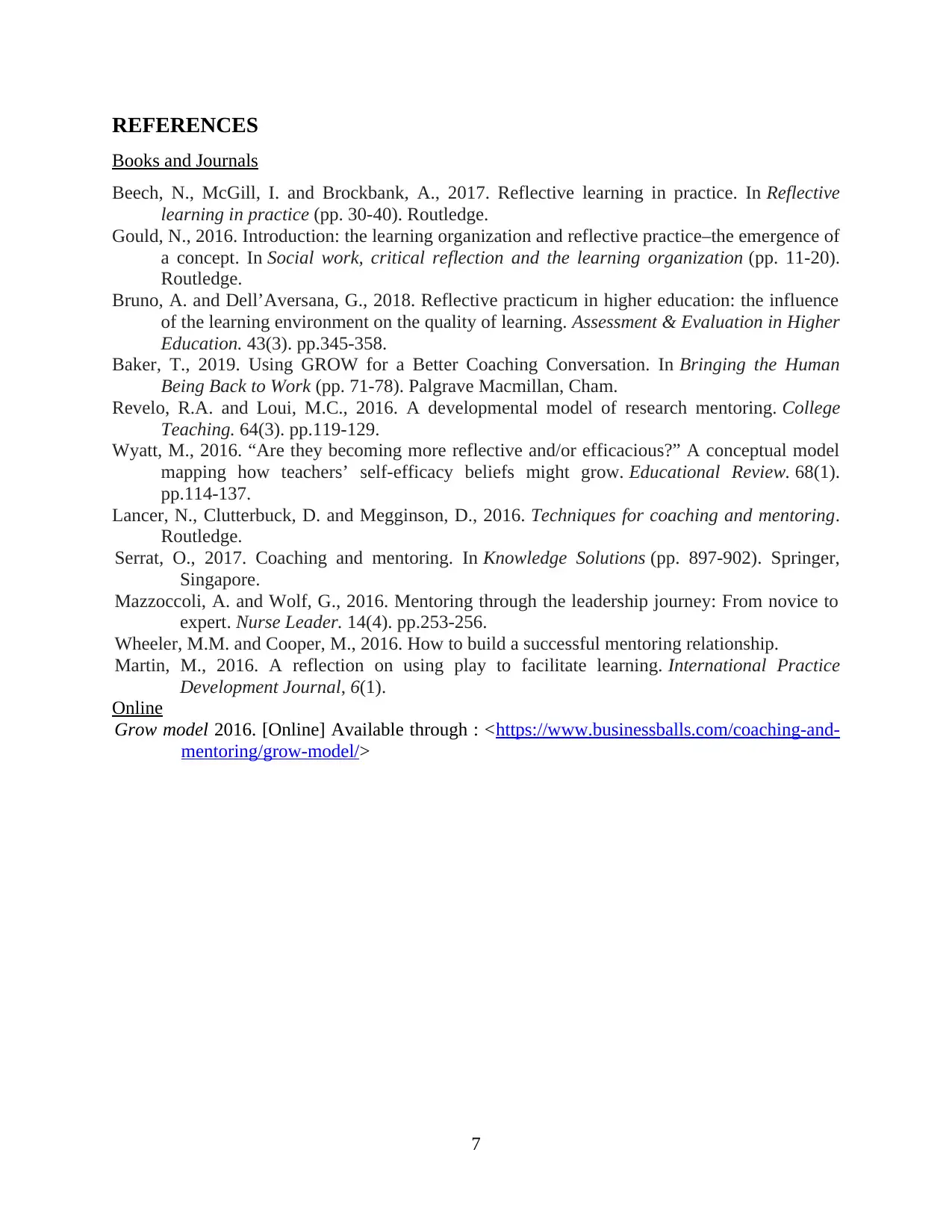
REFERENCES
Books and Journals
Beech, N., McGill, I. and Brockbank, A., 2017. Reflective learning in practice. In Reflective
learning in practice (pp. 30-40). Routledge.
Gould, N., 2016. Introduction: the learning organization and reflective practice–the emergence of
a concept. In Social work, critical reflection and the learning organization (pp. 11-20).
Routledge.
Bruno, A. and Dell’Aversana, G., 2018. Reflective practicum in higher education: the influence
of the learning environment on the quality of learning. Assessment & Evaluation in Higher
Education. 43(3). pp.345-358.
Baker, T., 2019. Using GROW for a Better Coaching Conversation. In Bringing the Human
Being Back to Work (pp. 71-78). Palgrave Macmillan, Cham.
Revelo, R.A. and Loui, M.C., 2016. A developmental model of research mentoring. College
Teaching. 64(3). pp.119-129.
Wyatt, M., 2016. “Are they becoming more reflective and/or efficacious?” A conceptual model
mapping how teachers’ self-efficacy beliefs might grow. Educational Review. 68(1).
pp.114-137.
Lancer, N., Clutterbuck, D. and Megginson, D., 2016. Techniques for coaching and mentoring.
Routledge.
Serrat, O., 2017. Coaching and mentoring. In Knowledge Solutions (pp. 897-902). Springer,
Singapore.
Mazzoccoli, A. and Wolf, G., 2016. Mentoring through the leadership journey: From novice to
expert. Nurse Leader. 14(4). pp.253-256.
Wheeler, M.M. and Cooper, M., 2016. How to build a successful mentoring relationship.
Martin, M., 2016. A reflection on using play to facilitate learning. International Practice
Development Journal, 6(1).
Online
Grow model 2016. [Online] Available through : <https://www.businessballs.com/coaching-and-
mentoring/grow-model/>
7
Books and Journals
Beech, N., McGill, I. and Brockbank, A., 2017. Reflective learning in practice. In Reflective
learning in practice (pp. 30-40). Routledge.
Gould, N., 2016. Introduction: the learning organization and reflective practice–the emergence of
a concept. In Social work, critical reflection and the learning organization (pp. 11-20).
Routledge.
Bruno, A. and Dell’Aversana, G., 2018. Reflective practicum in higher education: the influence
of the learning environment on the quality of learning. Assessment & Evaluation in Higher
Education. 43(3). pp.345-358.
Baker, T., 2019. Using GROW for a Better Coaching Conversation. In Bringing the Human
Being Back to Work (pp. 71-78). Palgrave Macmillan, Cham.
Revelo, R.A. and Loui, M.C., 2016. A developmental model of research mentoring. College
Teaching. 64(3). pp.119-129.
Wyatt, M., 2016. “Are they becoming more reflective and/or efficacious?” A conceptual model
mapping how teachers’ self-efficacy beliefs might grow. Educational Review. 68(1).
pp.114-137.
Lancer, N., Clutterbuck, D. and Megginson, D., 2016. Techniques for coaching and mentoring.
Routledge.
Serrat, O., 2017. Coaching and mentoring. In Knowledge Solutions (pp. 897-902). Springer,
Singapore.
Mazzoccoli, A. and Wolf, G., 2016. Mentoring through the leadership journey: From novice to
expert. Nurse Leader. 14(4). pp.253-256.
Wheeler, M.M. and Cooper, M., 2016. How to build a successful mentoring relationship.
Martin, M., 2016. A reflection on using play to facilitate learning. International Practice
Development Journal, 6(1).
Online
Grow model 2016. [Online] Available through : <https://www.businessballs.com/coaching-and-
mentoring/grow-model/>
7
⊘ This is a preview!⊘
Do you want full access?
Subscribe today to unlock all pages.

Trusted by 1+ million students worldwide
1 out of 9
Related Documents
Your All-in-One AI-Powered Toolkit for Academic Success.
+13062052269
info@desklib.com
Available 24*7 on WhatsApp / Email
![[object Object]](/_next/static/media/star-bottom.7253800d.svg)
Unlock your academic potential
Copyright © 2020–2026 A2Z Services. All Rights Reserved. Developed and managed by ZUCOL.



